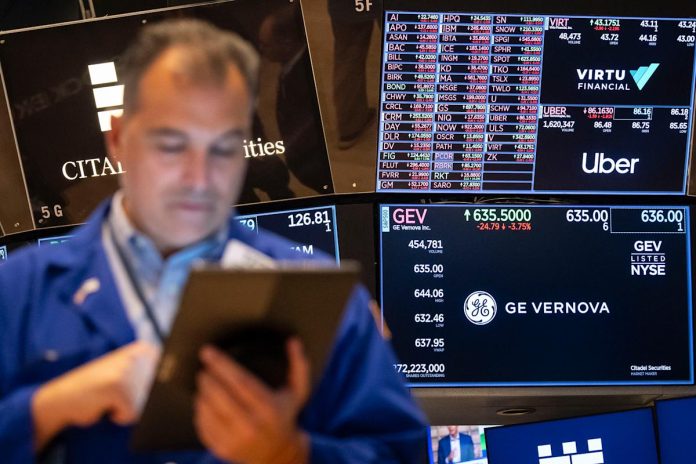U.S. stocks closed higher Friday, capping a choppy week of trading with the market’s third winning week in the last four and another milestone.
The S&P 500 rose 0.8%, finishing just shy of the record it set last week. The benchmark index also wiped out its losses from a slide last week.
The Dow Jones Industrial Average climbed 0.5%, and the Nasdaq composite added 1% to the all-time high it set a day earlier.
Technology companies, with their hefty stock values, did much of the heavy lifting for the market. Nvidia rose 1.1% and Apple gained 4.2%.
Gilead Sciences jumped 8.3% for one of the market’s biggest gains. It reported financial results that easily beat analysts’ forecasts, while also raising its earnings forecast for the year. Expedia Group rose 4.1% after also reporting encouraging financial results.
They are among the final big batch of companies within the S&P 500 to report mostly strong financial results for the second quarter. Still, many have warned that current tariffs could cut into their profits.
Financial sector stocks also helped drive the market higher. Bank of America gained 2.4% and Mastercard rose 2.3%.
Elsewhere in the market, entertainment giant Paramount Skydance slid 10.5% a day after the company was created by the closing of an $8 billion merger of Skydance and Paramount. Shares in rival Warner Bros. Discovery sank 8%.
The main focus throughout the week has been on President Donald Trump’s trade war and its potential impact on the U.S. economy, as well as the Federal Reserve’s interest rate policy. Trump began imposing higher import taxes on dozens of countries Thursday.
Still, the market appeared to largely shrug off the latest tariff escalation.
“The S&P 500’s rebound this week may highlight the extent to which the market is becoming numb to tariff headlines,” said Daniel Skelly, head of Morgan Stanley’s Wealth Management Market Research & Strategy Team.
The unknown path of the economy amid an unpredictable tariff policy has been the key reason for the Fed to hold its benchmark interest rate steady.
Fed Chair Jerome Powell, though, has been under increasing pressure from Trump to cut interest rates. Policy decisions aren’t made solely by the Fed chair. All 12 members of the Federal Open Market Committee vote on interest rate changes.
Trump has an opportunity to exert more control over the Fed following his nomination of Stephen Miran to a vacancy on the Fed’s board of governors. Miran is a top economic adviser to Trump and is a near-certain vote in support of lower interest rates.

